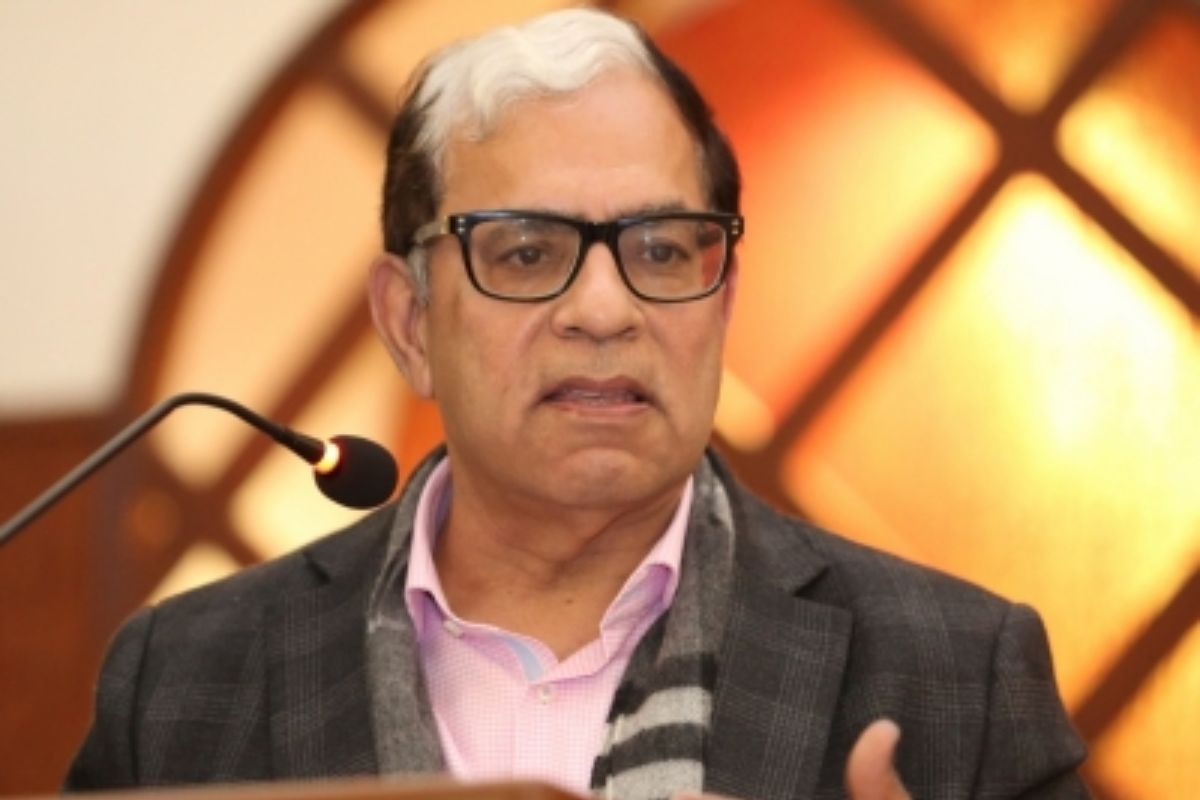“India needs an independent and fearless judiciary” reiterated Justice Arjan K. Sikri, former Judge, Supreme Court of India and International Judge, Singapore International Commercial Court at the Dr H.R. Bhardwaj Memorial Lecture held at Jindal Global Law School, O.P. Jindal Global University.
The title of the Dr H.R. Bhardwaj Memorial Lecture delivered by Justice Sikri was “Constitutionalism, Democracy and Rights: Role and Responsibilities of the Indian Judiciary”.
Advertisement
Justice Arjan K. Sikri observed, “The constitution of any country is the highest law of the nation. It is the instrument of governance of a nation state, with its defined objectives and institutions established to accomplish those objectives. Every good system of democracy, also commands that the elected government should follow well recognised precepts. These include following the legal norms and rules because the rule of law applies to elected representatives as well.
“More importantly, it is the responsibility of the government of the day to respect human rights such as freedom of speech, right to equality, and the right to life and liberty. It is also important to ensure certain rights to ethnic and other minorities, while adhering to the principles of democracy, thereby giving voice to the opposition as well.”
The intellectually engaging lecture was attended by the faculty and students of the Jindal Global Law School which is ranked among the top 100 law schools in the world and number one in India for three years in a row. The students of the Law School were witness to a masterclass in Constitutional Law by one of the leading luminaries of the Indian legal system.
“The principle of constitutionalism shows that the government acts within the sphere of powers allocated to it in a constitutional framework, and does not reach the limits of powers prescribed in the Constitution. This brings the necessity of governance by the rule of law, which essentially tells that the society is to be governed by law and not by the whims and fancies of those who govern. All those who exercise powers will have to act within the confines of law. In order to ensure that the rule of law prevails, a good Constitution also ensures that all powers are not in the hands of one institution.”
“In this lecture, my endeavour is to mention how the Constitution becomes a document of deliberative democracy by incorporating precepts and principles of constitutionalism. How rule of law ensures the attainment of limited government, where people are sovereign, and ultimately how all these cherished values can be achieved only when there is an independent judiciary, which is capable of discharging its functions without being influenced by others. Constitutionalism puts an obligation on the government to act in a manner which achieves social welfare, solidarity, economic equality and social justice. That is why an independent and fearless judiciary is needed in this country.”
Defining and explaining constitutionalism thus, Justice Sikri described the role of judiciary in upholding and advancing the spirit of constitutionalism.
“The task assigned to the judiciary is to become the final arbiter to decide whether any rights of the people are violated by government or government institutions. This is known as judicial review as we know it, and in many constitutions including the Indian constitution has the power of judicial review. This power is not limited only to the review executive actions, but it extends even to legislative acts as well. Therefore, if a particular act, even by the Parliament or the state legislature, has been enacted, which violates the provisions of the Constitution, the judiciary is given a power to invalidate or declare that particular Act as unconstitutional.”
Justice Arjan Sikri was welcomed by the Founding Vice Chancellor of O.P. Jindal Global University, Prof. (Dr.) C. Raj Kumar, who hailed the Late H.R. Bhardwaj as a visionary jurist who as Law Minister oversaw seminal developments in law and governance.
Prof. (Dr.) C. Raj Kumar said, “H.R. Bhardwaj was instrumental in the development of O.P. Jindal Global University is a higher educational institution which ensures academic freedom, autonomy and independence. He made yeoman contributions in developing this university which is the result of a philanthropic vision of the founding Chancellor and benefactor, Naveen Jindal. All through his tenure as law minister, he supported the evolution of this institution from its early origins, including the passing of the legislation for the university on January 27, 2009.
“Bhardwaj inspired us and constantly supported us in all our endeavours. Today, we are gathered to hear Justice Sikri speak at the memorial lecture instituted in the memory and honour of H.R. Bhardwaj. He was a luminous man who made extraordinary contributions to the advancement of law, justice, legal institutions, legal education and legal profession. He had a very keen interest and commitment towards nurturing institutions, supporting their evolution and their development. I also want to mention that Bhardwaj had a keen sense of history, his contributions in the larger context of 75 years of independence have been truly remarkable. O.P. Jindal Global University prides itself of having been fostered by H.R. Bhardwaj.”
Prof. Raj Kumar also warmly welcomed the family of Late H.R. Bhardwaj, including his wife Prafullata Bhardwaj, his son Arun Bhardwaj, grandsons Karan Bhardwaj and Gautam Bhardwaj and their spouses Pallavi Bhardwaj and Vidya Bhardwaj: “It is such a special moment for us to have the family of H.R. Bhardwaj to join us in commemorating his life at this seminal memorial lecture.
In his introductory remarks, Professor (Dr.) S.G. Sreejith, Executive Dean, Jindal Global Law School stated, “The reading of the Constitution of India should be a pilgrimage for the students of law. Despite us living in a postmodern age of unpredictability and uncertainty, when even our own convictions are under trial, we find consolation in reading the Constitution. Reading the Constitution is reinforcing our faith in our collective aspirations”.
The concluding note of thanks was given by the Registrar of O.P. Jindal Global University Prof. Dabiru Sridhar Patnaik.









